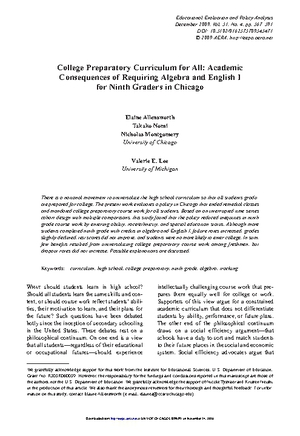1. To what extent did enrollment in ninth-grade college preparatory courses increase as a result of the policy mandate, and how did the social distribution of course taking by students’ race, ability level, and disability status change between pre- and post-policy periods?
2. Did the academic outcomes of students improve by taking college prep classes instead of remedial classes, and did the effects differ by their academic abilities as they began high school?
3. To what extent did the policy affect students’ academic outcomes overall, and how did the effects differ for students entering high school with different abilities?
There is a national movement to universalize the high school curriculum so that all students graduate prepared for college. The present work evaluates a policy in Chicago that ended remedial classes and mandated college preparatory course work for all students. Based on an interrupted time-series cohort design with multiple comparisons, this study found that the policy reduced inequities in ninth grade course work by entering ability, race/ethnicity, and special education status. Although more students completed ninth grade with credits in algebra and English I, failure rates increased, grades slightly declined, test scores did not improve, and students were no more likely to enter college. In sum, few benefits resulted from universalizing college preparatory course work among freshmen, but dropout rates did not increase. Possible explanations are discussed.
The final, definitive version of this paper has been published in Educational Evaluation and Policy Analysis, 31(4), December 2009 by SAGE Publications Ltd./SAGE Publications, Inc., All rights reserved. © 2009


